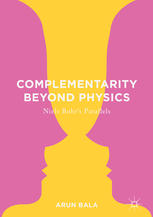

Most ebook files are in PDF format, so you can easily read them using various software such as Foxit Reader or directly on the Google Chrome browser.
Some ebook files are released by publishers in other formats such as .awz, .mobi, .epub, .fb2, etc. You may need to install specific software to read these formats on mobile/PC, such as Calibre.
Please read the tutorial at this link: https://ebookbell.com/faq
We offer FREE conversion to the popular formats you request; however, this may take some time. Therefore, right after payment, please email us, and we will try to provide the service as quickly as possible.
For some exceptional file formats or broken links (if any), please refrain from opening any disputes. Instead, email us first, and we will try to assist within a maximum of 6 hours.
EbookBell Team

4.0
76 reviewsIn this study Arun Bala examines the implications that Niels Bohr’s principle of complementarity holds for fields beyond physics. Bohr, one of the founding figures of modern quantum physics, argued that the principle of complementarity he proposed for understanding atomic processes has parallels in psychology, biology, and social science, as well as in Buddhist and Taoist thought. But Bohr failed to offer any explanation for why complementarity might extend beyond physics, and his claims have been widely rejected by scientists as empty speculation. Scientific scepticism has only been reinforced by the naïve enthusiasm of postmodern relativists and New Age intuitionists, who seize upon Bohr’s ideas to justify anti-realist and mystical positions.
Arun Bala offers a detailed defence of Bohr’s claim that complementarity has far-reaching implications for the biological and social sciences, as well as for comparative philosophies of science, by explaining Bohr’s parallels as responses to the omnipresence of grown properties in nature.